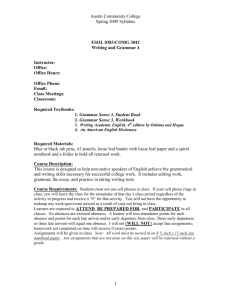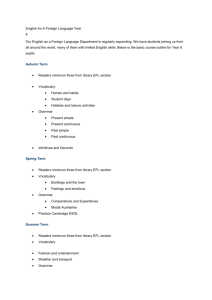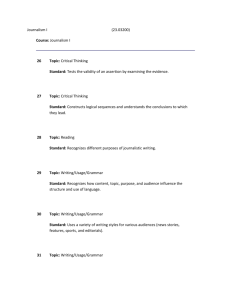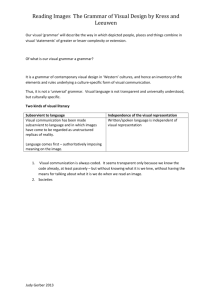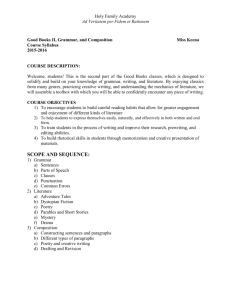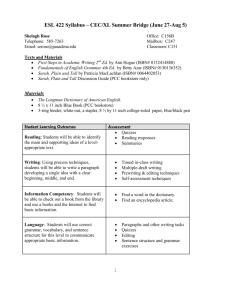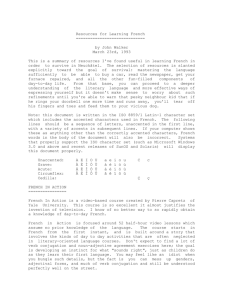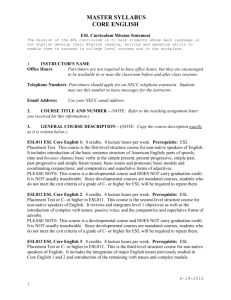ESL Grammar and Writing- English 0326
advertisement
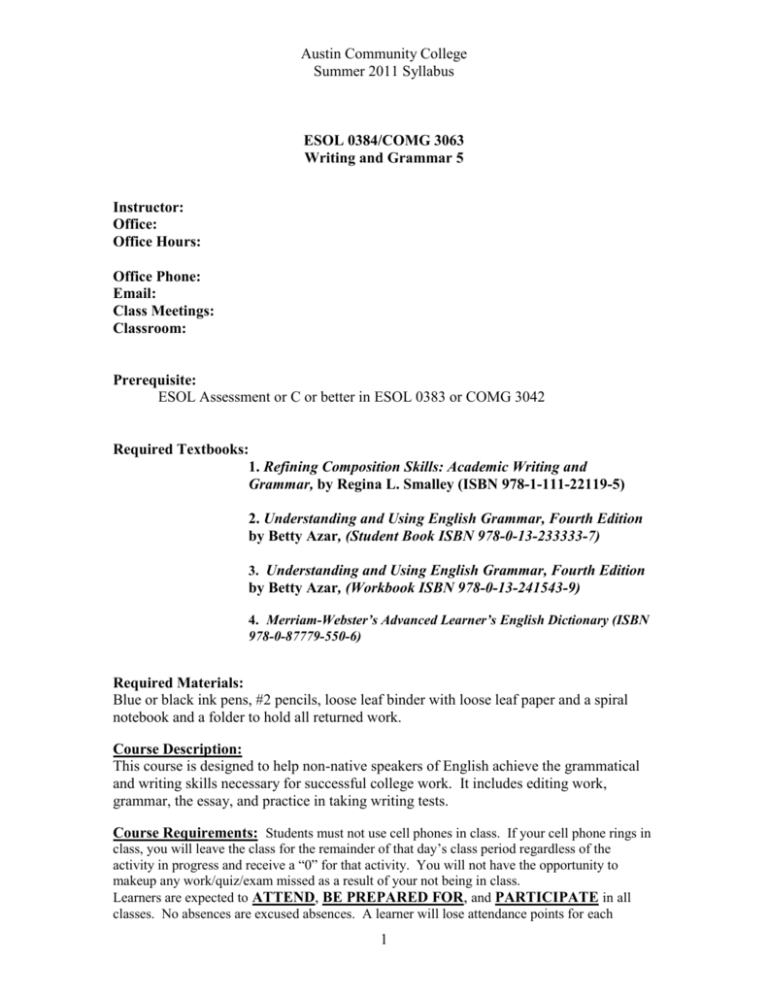
Austin Community College Summer 2011 Syllabus ESOL 0384/COMG 3063 Writing and Grammar 5 Instructor: Office: Office Hours: Office Phone: Email: Class Meetings: Classroom: Prerequisite: ESOL Assessment or C or better in ESOL 0383 or COMG 3042 Required Textbooks: 1. Refining Composition Skills: Academic Writing and Grammar, by Regina L. Smalley (ISBN 978-1-111-22119-5) 2. Understanding and Using English Grammar, Fourth Edition by Betty Azar, (Student Book ISBN 978-0-13-233333-7) 3. Understanding and Using English Grammar, Fourth Edition by Betty Azar, (Workbook ISBN 978-0-13-241543-9) 4. Merriam-Webster’s Advanced Learner’s English Dictionary (ISBN 978-0-87779-550-6) Required Materials: Blue or black ink pens, #2 pencils, loose leaf binder with loose leaf paper and a spiral notebook and a folder to hold all returned work. Course Description: This course is designed to help non-native speakers of English achieve the grammatical and writing skills necessary for successful college work. It includes editing work, grammar, the essay, and practice in taking writing tests. Course Requirements: Students must not use cell phones in class. If your cell phone rings in class, you will leave the class for the remainder of that day’s class period regardless of the activity in progress and receive a “0” for that activity. You will not have the opportunity to makeup any work/quiz/exam missed as a result of your not being in class. Learners are expected to ATTEND, BE PREPARED FOR, and PARTICIPATE in all classes. No absences are excused absences. A learner will lose attendance points for each 1 Austin Community College Summer 2011 Syllabus absence and points for each late arrival and/or early departure from class. Three early departures or three late arrivals will equal one absence. I will not (WILL NOT) accept late assignments; homework not completed on time will receive 0 (zero) points. Assignments will be given in class. Note: All work must be turned in on 8 ½ inch x 11 inch size notebook paper. Any assignments that are not done on this size paper will be returned without a grade. EVALUATION: This is an advanced, exit-level composition course designed to prepare you for regular college composition. Therefore, you must expect to write, write often and revise what you have written. IT IS NOT UNCOMMON FOR STUDENTS TO HAVE TO REPEAT THIS COURSE. ________________________________________________________________________ EXIT CRITERIA: In order to pass this course and exit the writing program you must do the following: 1. Have an average of 75% or better in your class work 2. Pass the grammar final with a 75% or better; pass the final essay with a score of 87 on the composition profile. Please note: Your final essay will be graded by at least two other instructors. For those students who meet these exit criteria, the following categories and percentages represent how your final grade will be determined. Grade Percentages for the course: Preparation/Homework is 20 % of the total grade. Quizzes/Tests are 10% of the total grade. Mid Term Exam is 15% of the total grade. Final Exam is 20% of the total grade. Attendance is 15 % of the total grade. Essays are 15 % of the total grade. Participation is 5 % of the total grade. Grades: A B C IP 90 – 100 points 80 – 89 points 70 – 79 points < 70 Points (In Progress) 2 Austin Community College Summer 2011 Syllabus ADA Statement: "Each ACC campus offers support services for students with documented physical or psychological disabilities. Students with disabilities must request reasonable accommodations through the Office for Students with Disabilities on the campus where they expect to take the majority of their classes. Students are encouraged to do this three weeks before the start of the semester" (Student Handbook, 2002-2003, p. 14). Academic Honesty "Acts prohibited by the College for which discipline may be administered include scholastic dishonesty, including but not limited to cheating on an exam or quiz, plagiarizing, and unauthorized collaboration with another in preparing outside work. Academic work submitted by students shall be the result of their thought, research or self-expression. Academic work is defined as, but not limited to tests, quizzes, whether taken electronically or on paper; projects, either individual or group; classroom presentations, and homework" (Student Handbook, 2002-2003, p. 32). Copyright: copyright laws protect all texts. Unless otherwise stated, it is illegal to make copies from the texts without the publisher’s written permission. 3
